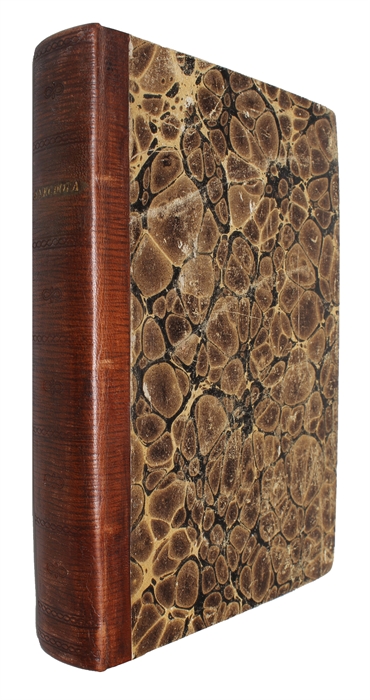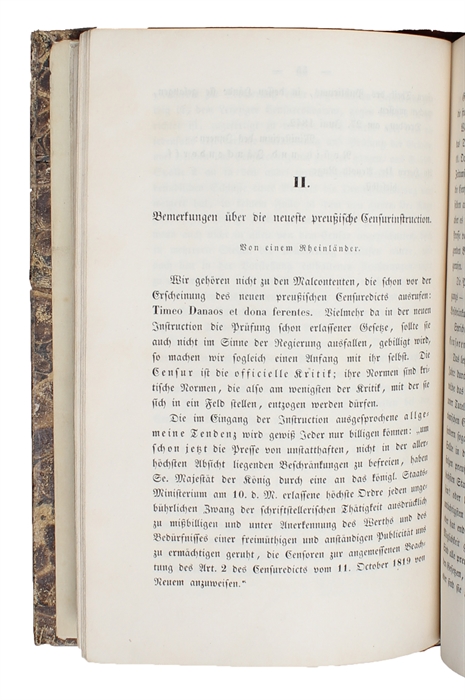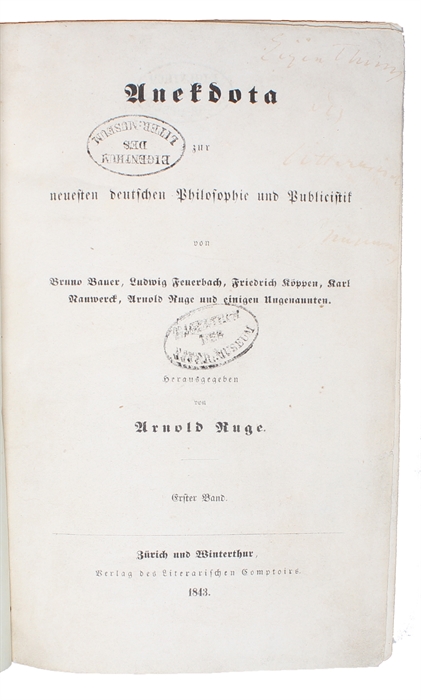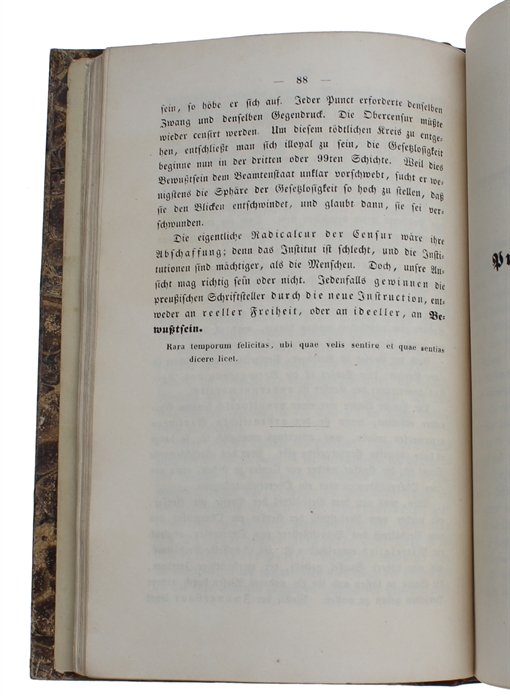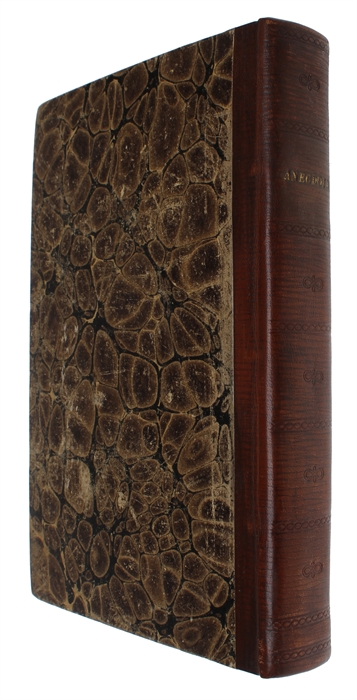DEFINING THE ESSENCE OF REASON AS FREEDOM - MARX' DEBUT ARTICLE
RUGE, ARNOLD (edt.) - KARL MARX.
Anekdota zur neuesten deutschen Philosophie und Publicistik von Bruno Bauer, Ludwig Feuerbach, Friedrich Köppen, Karl Nauwerk, Arnold Ruge und einigen Ungenannten. 2 bde. [(Marx): Bemerkungen über die neueste preußische Censurinstruction. Von einem Rheinländer].
Zürich & Winterthur, Literarischen Comptoirs, 1843.
8vo. Bound in one nice later half calf binding in contemporary style with gilt title and blindstamped ornamentation to spine. Faded inscription of "Eigenthus des Literar. Museum" to both title-pages and last leaf of bot volumes. Stamps of the same Litarary Museum to volume 1, at both title-page, last leaf and a few leaves inbetween. Neat pencil annotations to a few leaves of volume 1. Neatly washed and with a few tiny closed tears to second gathering. A small spot to lower blank margin of pp. 195-8 of vol. 1. Contents generally clean and crisp. All in all a evry nice copy. IV, 320 + IV, 288 pp. [Marx' paper: Vol. I, pp. 56-88].
Extremely scarce first edition of this two-volume periodical, which contains the first printing of Marx' first newspaper article, being the first political article written by Marx for publication, namely his "Comments on the Latest Prussian Censorship Instruction". This important debut work, which constitutes the foundation of Marxian dialectic and his formulation of Critical Hegelianism, was written between January 15 and February 10, 1842, but due to censorship restrictions, it first appeared here, in Ruge's "Anekdota", in Switzerland in 1843, to avoid German censorship.
"The young Marx and the young Engels ridiculed the Prussian Censorship Law of 1841. The attack of the young Mark, "Comments on the Latest Prussian Censorship Instruction," was written in 1842 but published a year later in Ruge's "Anekdota".
"Comments on the Latest Prussian Censorship Instruction" is an early exercise by the young Marx in the application of the categories of Hegelian critique. In this essay, the young Marx employed the Hegelian modalities of substance and essence to demonstrate the authoritarian nature of the Prussian Censorship Instruction. The young Marx utilized the concepts of substance and essence in the defence of free press.
"Comments on the Latest Prussian Censorship Instruction" defines the essence of a free press as free mind, or the essence of reason as freedom. The young Marx argues that it was impossible for reason to act in accordance with its essence unless it was totally free, because without absolute freedom, reason cannot follow its own insights to their logical conclusion. Consequently, when the Prussian Censorship Instruction limits the freedom of reason, when it sets boundaries beyond which reason cannot go, the Prussian Government annihilates the essence of reason.
The strategy of the young Marx is his essay is to adopt Hegelian logic in the cause of liberalism. He wished to show how Hegelian categories could be adjusted, could be transformed into weapons in the cause of political reform.
In this essay, the young Marx proved two things, that he interpreted Hegel as a critical Hegelian and that he himself continued this Critical Hegelian tradition. In 1842, the young Marx explored, experimented with the use of Hegelian categories, essence, and appearance as devices by which to advance the cause of political progressivism, and this was the meaning of Critical Hegelianism in the generation of Gans." (Norman Levine: Divergent Paths: Hegel in Marxism and Engelsism, pp. 142-43).
"Karl's [i.e. Marx] politics had closely followed those of Ruge ever since the end of the 1830s. In 1842 and 1843, their responses to immediate events, not least the "frivolous diatribes of the "Free", had remained very close. An established author, and in the possession of independent means, "Papa Ruge" - as Jenny called him - was clearly the senior partner in this collaboration. The banning of the "Deutsche Jahrbücher" in January 1843 as the result of Prussian pressure, together with the suppression of the "Rheinische Zeitung", meant the effective silencing of Young Hegelianism within Germany. The aim of the criticism, as it was applied among Young Hegelians, was to highlight the gap between the demands of reason and the behavior of the government, but its failure to make any significant headway against the Prussia of Friedrich Wilhelm IV had also pushed them both towards an open criticism of Hegel's political philosophy. (Gareth Steadman Jones: Karl Marx, Greatness and Illusion, p. 142).
Although another anonymous essay "Luther als Schiedsrichter zwischen Strauß und Feuerbach" (Vol. II, pp. 206-208) has long been attributed to Marx, the preface to MECW I now states that "recent research has proved that it was not written by Marx (Draper, register, p. 58). The piece might be by Feuerbach himself.
Order-nr.: 58875

